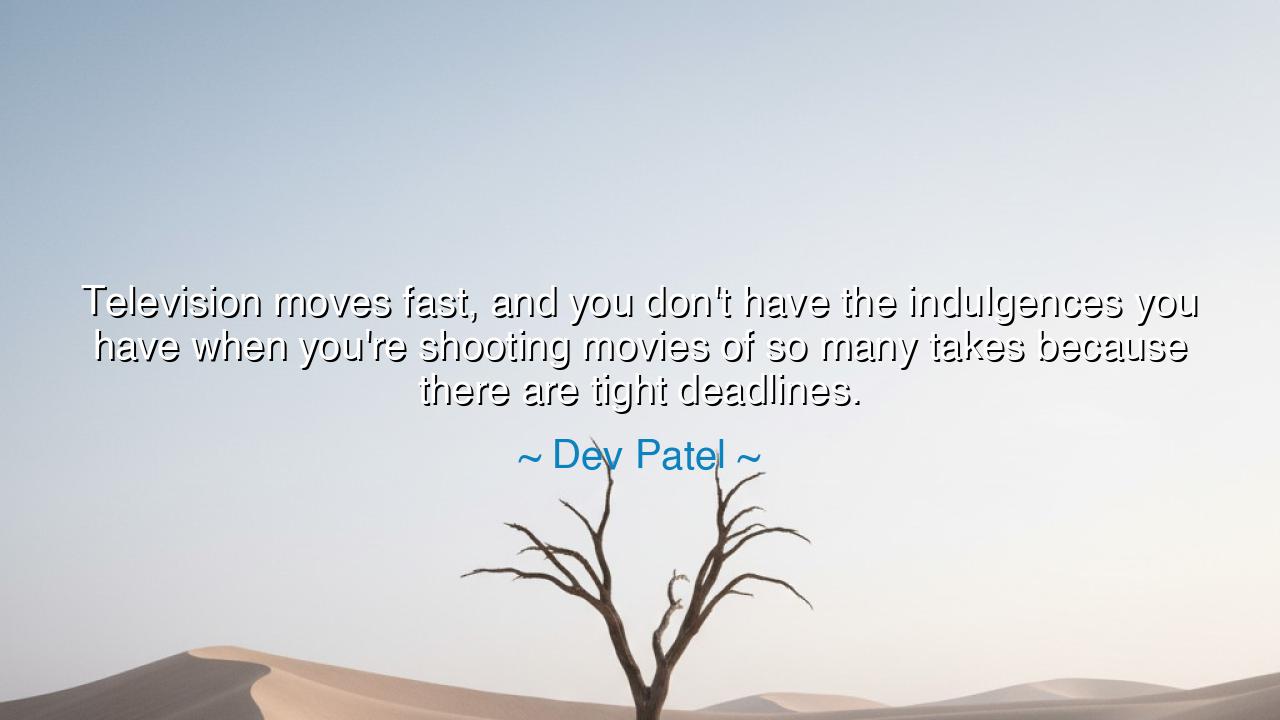
Television moves fast, and you don't have the indulgences you
Television moves fast, and you don't have the indulgences you have when you're shooting movies of so many takes because there are tight deadlines.






In the grand flow of time, there are forces that shape the way we approach our craft, the way we shape our work, and how we experience the pressures that drive us. Dev Patel captures the essence of this modern dilemma when he says, "Television moves fast, and you don't have the indulgences you have when you're shooting movies of so many takes because there are tight deadlines." These words speak to the difference between two forms of art, where the freedom to explore, to take one's time, is traded for the relentless speed of production, the constraints that limit artistic indulgence. Patel's reflection reveals the tension between quality and efficiency, the challenge of balancing creativity with the need to meet the demands of the present.
Consider, if you will, the ancient sculptors—artists like Phidias, who carved the great statues of Olympia, or Michelangelo, who labored over the Sistine Chapel for years. These masterpieces were not created in a hurried manner, nor were they bound by deadlines. The creators had the freedom to shape and refine their work over time, each chisel strike deliberate, every brushstroke a reflection of their deepest intentions. They were afforded the luxury of indulgence, time to meditate on each detail, to make each creation a true reflection of their genius. In this sense, Dev Patel’s words remind us of the difference between the artistry of a sculptor working in solitude over many years and the fast-paced demands of modern television and media.
In contrast, the world of television is governed by the swift passage of time, by the urgency of the moment. The deadlines of the modern world, driven by the need for constant production and rapid consumption, have reshaped the way we create. The modern filmmaker, much like the heroes of old who fought in battles where time was often of the essence, must adapt to the relentless pace. There is little time for hesitation, and few moments for reflection. The television industry, much like the ancient warriors, demands immediacy—action must be taken, decisions made quickly, without the luxury of endless revisions or retakes.
Think of Alexander the Great, who was driven by ambition and vision, yet was often constrained by the need to move swiftly from one conquest to the next. Unlike his predecessors, whose empires were built over centuries, Alexander was compelled by the tight deadlines of his military campaigns, rushing toward his ultimate goal without the time for reflective thought. The battlefields he faced were not places of indulgence where strategy could be pondered endlessly, but places where speed and decisiveness were paramount. Similarly, in the world of television, every scene is a battle against time, with speed often taking precedence over the luxury of perfecting every detail.
Yet, within this speed and urgency, there lies a great lesson. Patel’s words remind us that in today’s world, we must learn to balance quality with urgency. The artist who works under pressure may not have the time to indulge in multiple takes or to perfect every line, but there is an undeniable value in learning to create under constraints. The great warriors and heroes of the ancient world understood that, though time may not always be on their side, their ability to act decisively, to make the most of the moment, was what led them to victory. Similarly, in modern filmmaking, television, and life itself, our success may lie not in having unlimited time, but in making choices that move us forward despite the constraints.
In this, there is a profound lesson: the true test of creativity and strength is not found in the luxury of time, but in the ability to perform under pressure. The hero’s journey, whether it’s in the art of cinema or in the battlefields of history, is one that demands quick thinking, adaptability, and the wisdom to know that action often trumps hesitation. The artist who can create under the pressure of tight deadlines is not simply a person who works quickly, but one who has learned to hone their craft to the point where efficiency does not hinder quality.
As you walk your path, remember that there will always be moments where time is your enemy, where the world demands results faster than you can refine your work. But understand this: it is in these moments of pressure that your true artistry is forged. Whether you are an artist, a warrior, or a leader, learn to embrace the urgency of the moment, knowing that in the end, it is not time that shapes your legacy, but your ability to act with grace, wisdom, and decisiveness. Create boldly, even under the tightest of deadlines, and let your work reflect not only the depth of your effort but the power of your resolve.






AAdministratorAdministrator
Welcome, honored guests. Please leave a comment, we will respond soon